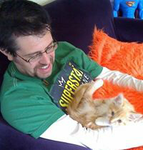The Clone Ranger
None
An interview with Dr Edward Darmos. He’s growing humans, you know?
ADVERTISING FEATURE
So, Dr Darmos, what is synthetic somatology?
“In brief, it’s a process by which we could one day grow adult humans from scratch, having designed everything about them – physical and mental aptitudes, resistance to disease, that sort of thing. Eventually, we’ll even be able to design their personalities and give them established skill-sets.”
Why does this remind me of Gattaca ?
“Well, this sort of idea isn’t exactly new, but I should be clear that we’re not looking at replacing normal human growth and development, or interfering in society at all – at the moment, it’s more an exploration of a thought experiment: how we could establish a functional human colony on a planet in another star system. For that, I believe we need to be able to make systems to automatically grow human adults, complete with skills and suitable attributes to survive in a different environment.”
Sign up to the SFX Newsletter
Get sneak previews, exclusive competitions and details of special events each month!
“The reason I believe it’s possible is that the technology already exists in one form or another – look at the NASA bioreactor and DARPA’s REMIND programme – that’s the sort of technology we’re looking at. A few more years pinning down what each gene does in relation to others, and how to reliably create a functional genome, and we’ll be ready to go. Assuming, of course, we can construct a suitable vehicle.”
You’re looking into establishing colonies on other worlds – does this mean that you believe we’re close to that?
“I’d like to think so, yes. There have already been experiments as part of the MARAUDER program that projected plasma at ‘a significant proportion’ of the speed of light, which is a pretty good start. Even if that isn’t in itself a vehicle, the propulsive power could be used to provide momentum. Then there’s the abandoned Project Orion that Dyson worked on, which postulated using a series of small nuclear blasts to gradually bring an object up to speed. It seemed an eminently sensible approach, as long as you have some other method to move it out of the ionosphere first.
“If we don’t need to worry about humans having to survive the journey, these all begin to seem that much more feasible as methods of interstellar transportation. We certainly wouldn’t need to figure out things like Alcubierre drives or Krasnikov tubes.”
Back onto synthetic somatology, how far along are you?
“Well, we’re entering the second phase of research at the moment, which involves working with a large number of research groups and universities, as well as volunteers, so that we can more accurately map the human genome. We need to find out what every gene does, so that we can design people appropriately, as well as being able to adapt designs to match the environmental conditions they find.”
Or aliens, perhaps?
“Perhaps. The galaxy is a big place, though, so I’d be surprised if we came across any sentient life for quite some time. Of course, as Zelazny wrote, ‘Positing infinity, the rest is easy.’ In an infinite universe, anything is possible.”

Dave is a TV and film journalist who specializes in the science fiction and fantasy genres. He's written books about film posters and post-apocalypses, alongside writing for SFX Magazine for many years.


